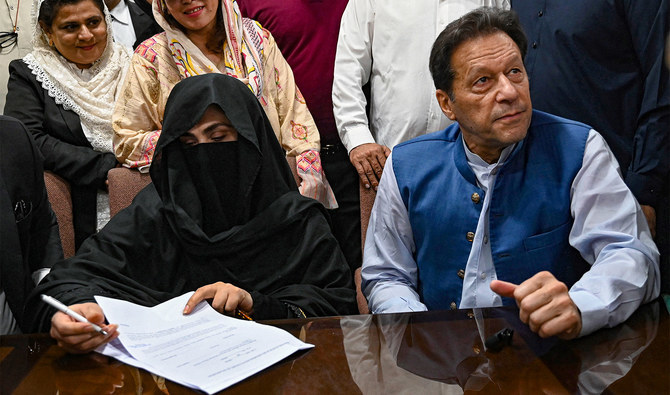ISLAMABAD: A district and sessions court in Islamabad on Thursday reserved its verdict on appeals challenging seven-year jail sentences each for former Pakistani Prime Minister Imran Khan and his wife Bushra Khan for violating the country’s marriage law.
Khan and his wife were sentenced to seven years in prison and fined in February by a court that ruled their 2018 marriage broke the law. Bushra was accused of not completing the waiting period mandated by Islam, called “Iddat,” after divorcing her previous husband and marrying Khan.
The Khans signed their marriage contract, or “Nikkah,” in January 2018 in a secret ceremony seven months before the former cricket superstar became prime minister for the first time. There was controversy over whether they had wed before the Iddat period was complete. After initial denials of the marriage, Khan’s Pakistan Tehreek-e-Insaf confirmed it weeks later.
The Khans both deny wrongdoing.
“The court will announce the judgment on May 29 (Wednesday),” Pakistan’s Express Tribune newspaper reported. Other Pakistani media also widely reported that the judgment would be announced next week.
Bushra is currently serving out two prison sentences at Adiala Jail where Khan is also incarcerated. In January, both were sentenced to 14 years in prison in a case that relates to accusations they undervalued gifts from a state repository and gained profits from selling them while Khan was prime minister from 2018-22.
CASES
Khan was first jailed after being handed a three-year prison sentence in August 2023 by the Election Commission for not declaring assets earned from selling gifts worth more than 140 million rupees ($501,000) in state possession and received during his premiership. In January, Khan and Bushra were handed 14-year jail terms following a separate investigation by the country’s top anti-graft body, or NAB, into the same charges involving state gifts.
An anti-graft court in Islamabad also handed Khan a 10-year jail term in January for revealing state secrets, a week before national elections on Feb. 8. The ruling on his marriage to Bushra and a seven-year sentence each for both also came ahead of the polls.
Khan has also been indicted under Pakistan’s anti-terrorism law in connection with violence against the military that erupted following his brief arrest related to a land graft case on May 9. A section of Pakistan’s 1997 anti-terrorism act prescribes the death penalty as maximum punishment. Khan has denied the charges under the anti-terrorism law, saying he was in detention when the violence took place.
Khan’s convictions, which mean he is banned from holding public office, ruled the 71-year-old out of the February general elections. Arguably Pakistan’s most popular politician, Khan says all cases against him are motivated to keep him out of politics.
SPIRITUAL LEADER
Bushra’s ex-husband, Khawar Maneka, to whom she was married for about 30 years, brought a criminal complaint against the Khans.
Khan has often called Bushra his spiritual leader. She is known for her devotion to Sufism, a mystical form of Islam.
Born Bushra Riaz Watto, she changed her name to Khan after her marriage. Her husband and followers commonly refer to her as Bushra Bibi or Bushra Begum, titles that denote respect in Urdu.
Khan’s two previous marriages — to Jemima Goldsmith, daughter of tycoon James Goldsmith, and television journalist Reham Nayyar Khan — ended in divorce.
















